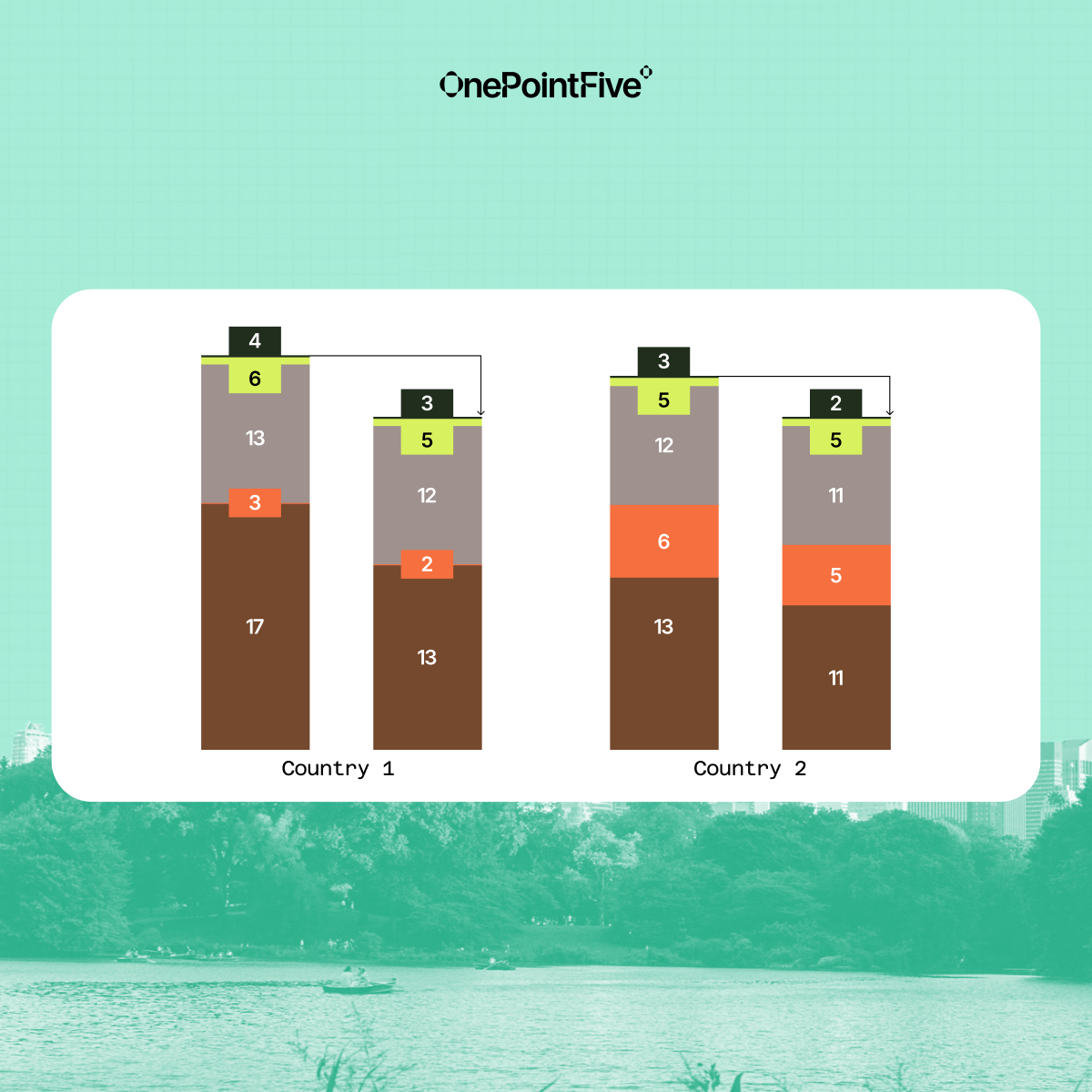Transform Climate Strategy into Business Action Through Financial-Grade Decarbonization Planning
Master the strategic frameworks and financial tools that turn sustainability commitments into profitable decarbonization pathways. Learn to build data-driven business cases, design marginal abatement cost curves, and operationalize carbon reduction initiatives that deliver measurable environmental and financial returns.
Why This Module Matters
Corporate decarbonization has reached a critical inflection point where financial performance and climate action converge. Companies with finance-led sustainability initiatives outperform peers by 36% on climate metrics, while organizations can typically abate 20-40% of emissions while reducing costs by 2030. Yet despite 76% of global emissions being covered by net-zero targets, implementation realities are challenging these commitments—with many companies scaling back from ambitious goals due to execution gaps. This disconnect creates unprecedented opportunity: 93% of executives see sustainability as key to commercial success, but most lack the financial frameworks to translate climate targets into actionable investment strategies. This module bridges that gap by teaching the quantitative methodologies that transform sustainability from cost center to value driver, enabling professionals to design decarbonization strategies that satisfy both CFOs and climate scientists.
Learning Outcomes
By completing Module 5, you'll confidently:
✓ Design and execute marginal abatement cost curve (MACC) analyses to prioritize carbon reduction investments strategically
✓ Apply advanced financial modeling techniques including NPV calculations, discount rates, and salvage value analysis to decarbonization projects
✓ Navigate the evolving carbon markets landscape and distinguish between offsets, credits, allowances, and insetting strategies
✓ Implement internal carbon pricing mechanisms that drive operational decision-making and capital allocation
✓ Evaluate decarbonization opportunities across industries using sector-specific abatement potential and cost analysis
✓ Develop comprehensive transition plans that sequence initiatives from operational efficiency to transformational investments
✓ Create stakeholder-ready business cases that connect climate action to financial performance and competitive advantage
Core Learning Content
Strategic Decarbonization Fundamentals
Master corporate decarbonization definitions, benefits, and leading industry trends across operational efficiency, climate-friendly power sources, and behavioral change initiatives
Analyze the $9.8B+ in operational savings that major corporations have achieved through integrated sustainability investments
Understand the competitive advantage framework where green premiums enable profitable abatement actions and market differentiation
Navigate regulatory landscapes from EU CBAM to California's climate legislation affecting 10,000+ companies
Evaluate industry-specific decarbonization approaches from infrastructure development to packaged food corporations
Finance-Driven Implementation Leadership
Apply the proven methodology showing CFO-led sustainability delivers 36% better climate performance compared to other organizational approaches
Design comprehensive financial models incorporating project lifetime costs, operating expenses, revenue projections, and debt service considerations
Master net present value calculations that account for cost escalations, salvage value, and the time value of money in long-term projects
Implement internal carbon pricing strategies using shadow pricing, implicit fees, and direct charges to steer operational decisions
Navigate the critical implementation gap where only 18% of companies disclose credible financial planning aligned with their climate targets
Marginal Abatement Cost Curve (MACC) Mastery
Execute the complete 4-step MACC methodology from data gathering through strategic operationalization and continuous improvement
Build industry-standard abatement cost curves that visualize trade-offs between carbon impact potential and implementation costs
Apply professional tools and platforms for rapid MACC generation, scenario analysis, and sensitivity testing
Prioritize decarbonization initiatives using lowest-cost sequencing while balancing strategic bets and operational tactics
Translate MACC findings into actionable recommendations for C-suite decision-making and capital allocation
Carbon Markets and Pricing Strategy
Navigate the evolution from voluntary carbon markets to compliance-driven systems including EU ETS pricing growth of 7x since 2018
Master the distinction between carbon removal and reduction projects, understanding storage requirements and permanence criteria
Apply high-quality carbon credit evaluation using seven core principles: real, additional, permanent, enforceable, verified, transparent, and inclusive
Implement strategic approaches to offsets vs. insets, understanding value chain applications and beyond-value-chain mitigation
Evaluate emerging initiatives from Frontier's advanced market commitments to REDD+ project assessment and climate justice considerations
Integrated Decarbonization Planning
Design pathway-to-net-zero strategies that sequence 2030 targets (50% reduction) through 2050 goals using abatement ramp-up approaches
Navigate cross-sector collaboration opportunities including supply chain financing innovations and renewable energy coalitions
Address adaptation and resilience integration with 1-in-5 companies lacking climate adaptation plans across critical infrastructure sectors
Apply sector-specific decarbonization focus areas from technical industrial reductions to nature-based solutions and materials innovation
Develop stakeholder alignment strategies that balance environmental goals, business constraints, and community equity considerations
Interactive Learning Experience
Strategic Decarbonization Lab: Voyager Airlines Case Study
Transform into a sustainability strategist in this comprehensive financial modeling workshop where you'll guide Voyager Airlines—a major European carrier with 1,200+ daily departures across 90 countries—through a complete decarbonization strategy development process. Working in collaborative teams, you'll navigate the airline's challenge: highly motivated leadership seeking data-driven sustainability action while managing industry greenwashing concerns and cost uncertainties. Through hands-on Excel modeling, you'll master net present value calculations for carbon abatement projects, incorporating complex variables like cost escalations, salvage values, and tax benefits across 10-year project timelines. Using professional MACC generation tools, you'll build marginal abatement cost curves that visualize trade-offs between initiatives spanning operational efficiency (departure/arrival planning), climate-friendly power sources (bio-based and hydrogen fuels), and behavioral change programs. The lab culminates in strategic decision-making where you'll synthesize quantitative analysis with qualitative factors—from supply chain labor concerns to regulatory compliance—to recommend the top 3 initiatives for C-suite approval, experiencing firsthand how financial rigor transforms sustainability from aspiration into executable strategy.
Module Details
Duration: 6-8 hours total learning time
Format: Advanced curriculum modules, hands-on financial modeling lab, collaborative strategy workshop, industry case study analysis
Materials: Excel/Google Sheets templates, professional MACC generation tools, aviation industry datasets, interactive breakout rooms
Prerequisites: Basic financial concepts helpful; completion of carbon accounting modules recommended for emissions calculation context

